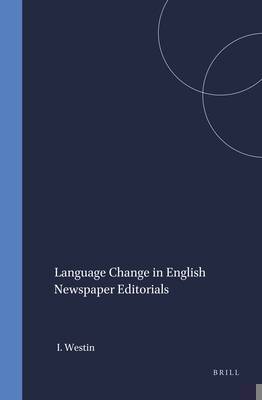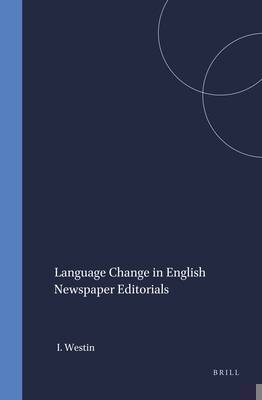
- Retrait gratuit dans votre magasin Club
- 7.000.000 titres dans notre catalogue
- Payer en toute sécurité
- Toujours un magasin près de chez vous
- Retrait gratuit dans votre magasin Club
- 7.000.0000 titres dans notre catalogue
- Payer en toute sécurité
- Toujours un magasin près de chez vous
Description
This work is a corpus-based study of the language of English up-market ("quality") newspaper editorials, covering the period 1900-1993. CENE, the Corpus of English Newspaper Editorials, was compiled for the purposes of this study and comprises editorials from the Daily Telegraph, the Guardian, and The Times chosen to represent periods at ten-year intervals. The language of the editorials was investigated with regard to features that previous research had proved to be markers of such types of discourse as might be of interest to an investigation of the development of the language of newspaper editorials.
To begin with, sets of features associated with the empirically defined dimensions of linguistic variation presented in Biber (1988) were compared across decades and newspapers; these dimensions included personal involvement and information density, narrative discourse, argumentative discourse, abstract discourse, and explicit reference. However, since the study showed that the features within each set often developed in diverging directions, the old sets were broken up and new ones formed on the basis of change and continuity as well as of shared linguistic/stylistic functions, specific for newspaper editorials, among the features involved. It then became apparent that, during the 20th century, the language of the editorials developed towards greater information density and lexical specificity and diversity but at the same time towards greater informality, in so far as the use of conversational features increased. The narrative quality of the editorials at the beginning of the century gradually decreased whereas their reporting and argumentative functions remained the same over the years.
When the features were compared across the newspapers analyzed, a clear distinction was noticed between The Times and the Guardian. The language of the Guardian was the most informal and the most narrative while that of The Times was the least so. The information density was the highest inThe Times and the lowest in the Guardian. In these respects, the Daily Telegraph took an intermediate position. The editorials of the Guardian were more argumentative than those of both the Daily Telegraph and The Times. As regards lexical specificity and diversity as well as sentence complexity, the Daily Telegraph scored the highest and The Times the lowest while the results obtained for the Guardian were in between the two.
To begin with, sets of features associated with the empirically defined dimensions of linguistic variation presented in Biber (1988) were compared across decades and newspapers; these dimensions included personal involvement and information density, narrative discourse, argumentative discourse, abstract discourse, and explicit reference. However, since the study showed that the features within each set often developed in diverging directions, the old sets were broken up and new ones formed on the basis of change and continuity as well as of shared linguistic/stylistic functions, specific for newspaper editorials, among the features involved. It then became apparent that, during the 20th century, the language of the editorials developed towards greater information density and lexical specificity and diversity but at the same time towards greater informality, in so far as the use of conversational features increased. The narrative quality of the editorials at the beginning of the century gradually decreased whereas their reporting and argumentative functions remained the same over the years.
When the features were compared across the newspapers analyzed, a clear distinction was noticed between The Times and the Guardian. The language of the Guardian was the most informal and the most narrative while that of The Times was the least so. The information density was the highest inThe Times and the lowest in the Guardian. In these respects, the Daily Telegraph took an intermediate position. The editorials of the Guardian were more argumentative than those of both the Daily Telegraph and The Times. As regards lexical specificity and diversity as well as sentence complexity, the Daily Telegraph scored the highest and The Times the lowest while the results obtained for the Guardian were in between the two.
Spécifications
Parties prenantes
- Auteur(s) :
- Editeur:
Contenu
- Nombre de pages :
- 220
- Langue:
- Anglais
- Collection :
- Tome:
- n° 44
Caractéristiques
- EAN:
- 9789042008632
- Date de parution :
- 01-01-02
- Format:
- Livre broché
- Format numérique:
- Trade paperback (VS)
- Dimensions :
- 156 mm x 234 mm
- Poids :
- 317 g

Les avis
Nous publions uniquement les avis qui respectent les conditions requises. Consultez nos conditions pour les avis.






